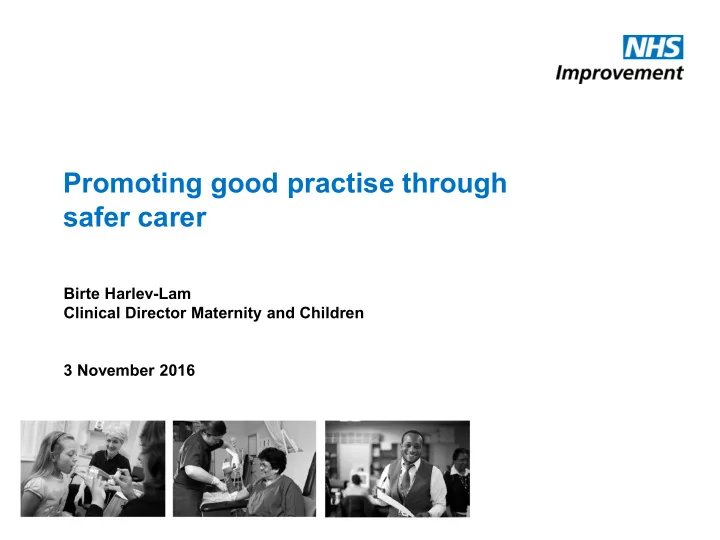

Promoting good practise through safer carer Birte Harlev-Lam Clinical Director Maternity and Children 3 November 2016
Maternity Safety Action Plan A focus on improving safety and outcomes For women, new-born and families This ambition cannot be achieved through national initiatives alone • we need a strong and energised programme of work on maternity • partners at local and regional levels coming together to drive improvements • to build a culture of openness where teams can work together to share learning when things go wrong. 2
Maternity Safety Action Plan Focus on leadership • Board level Maternity Champion appointed. • Trusts will have one obstetrician and one midwife jointly responsible for championing maternity safety in their organisation. • Bespoke Maternity Safety Improvement Plan agreed and made public. Focus on learning and best practice • Informed by the independent evaluation, NHS England will publish the final version of the Saving Babies’ Lives care bundle for use by maternity commissioners and providers by April 2018. • A package of publications and resources will be available for maternity and neonatal teams to support them to provide safer care and avoid unnecessary separation of mother and baby. Focus on teams • Learning and development plan in place for entire multi-disciplinary team. • The maternity team has attended maternity safety training, with funding from the Maternity Safety Training Fund. 3
Maternity Safety Action Plan Focus on data • Trust is reporting to Maternity Services Dataset and other key data sets such as MBRRACE- UK, the Royal College of Obstetricians and Gynaecologists’ Each Baby Counts programme, the National Neonatal Dataset and the new National Maternity and Perinatal Audit. • Maternity and neonatal teams are using the Standardised Perinatal Mortality Review Tool to review and share learning from every stillbirth and neonatal death, when it is available. • Maternity team is using national indicators dashboard to track their outcomes over time and benchmark against other organisations in their local maternity system and across the region. Focus on innovation • The maternity team will be taking part in the new national Maternal and Neonatal Health Quality Improvement Programme in their region. Individual or team may have applied for and used funding from the Maternity Safety Innovation Fund to develop an innovative idea. 4
Maternity Safety The Maternity Safety Action Plan: key elements Maternity Safety Action Plan Movement building A common The appointment of Matthew Jolly and Jacqueline Dunkley-Bent as A common goal national maternity safety champions, and board-level champions in goal every Trust. Build leaders Build leaders New money for a multi-disciplinary training fund, taking the total available to £8m. Applications are open now, from HEE’s website. Mobilise resources A new National Maternal and Neonatal Health Quality Improvement Programme to support maternity units to plan and implement Give concrete improvements. ownership A new Maternity and Neonatal Safety Innovation Fund of £250,000. Freedom to be creative ‘Our Chance’ campaign, a public -facing communications campaign developed in partnership with Sands and Best Beginnings. Bring people on board All trusts will be mandated to submit data to the Maternity Services Dataset by 2018 and we welcome those who are already fast Data and tracking this to achieve it earlier. analytics Measure The CCG IAF Maternity Indicators will measure progress in local progress areas and identify which areas have most scope for improvement. DH – Leading the nation’s health and care
Maternity and neonatal Quality Improvement programme • Overarching Aim: To support clinical teams in England to improve the safety of their maternity clinical care processes and contribute to an overall 20% reduction in the rates of stillbirths, neonatal and maternal deaths and intrapartum brain injuries in babies by 2020. • Evidence of impact in maternity: – In Scotland, stillbirths reduced by 15 percent in three years. – Of 28 participating organisations in the USA, 15 percent achieved caesarean delivery rate reductions of 30 percent or more during the 12- month period of active collaborative work. An additional 50 percent achieved reductions between 10 and 30 percent.
Maternity and neonatal Quality Improvement programme • 3 year national QI programme • 136 trusts with maternity units • Multidisciplinary and each trust will need to identify minimum of 3 key representatives - obstetrician, midwife, senior manager • Supported by effective regional communities of practice • Develop QI capability at every level of maternity systems • Steering group to provide oversight and direction with support from an advisory faculty and programme delivery team
Programme support to maternity units Annual national Tailored Wave learning learning event resources and sessions networks All Measurement Monthly for community of improvement practice units support meetings Access to LIFE Monthly Trust improvement Improvement visits platform & capability development 8
Activity of an Individual Maternity System in Wave 1 October to April to April to March 2017 September 2017 September 2018 - Cultural - Local priority assessments & setting - Support of local diagnostic - Project local wave 2 - Capability adoption from systems development pick list - Development and - Sharing of local COP improvement through national coach training COP 9
QI Communities of Practices • Facilitated and supported by SCN/PSC/AHSN • Additional support through national programme delivery team and advisory faculty • Provision of a community forum through regular meetings between learning events • Opportunity for group QI capability building • Peer support and shared learning • Opportunity to address common issues across footprint or ‘solution generation’ for specific issues within units / trusts • Opportunities for reducing variation
Next Steps • Steering Group and Advisory Faculty to provide national / local support and programme aim and measures • Identification of case studies and improvement tools for programme use • Development of communities of practice with PSCs and SCNs • Development of web platform to host resources and for programme learning / sharing • Launch event March 2017 B.harlev-lam@nhs.net @BirteLam
Recommend
More recommend